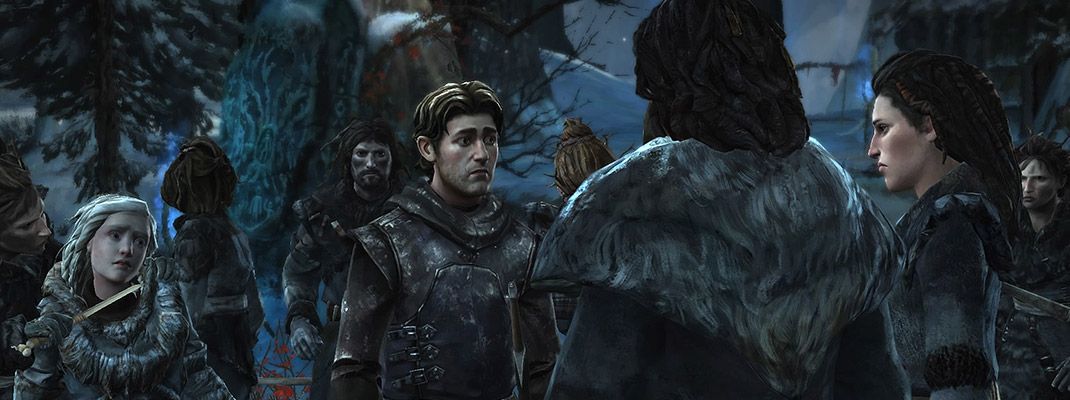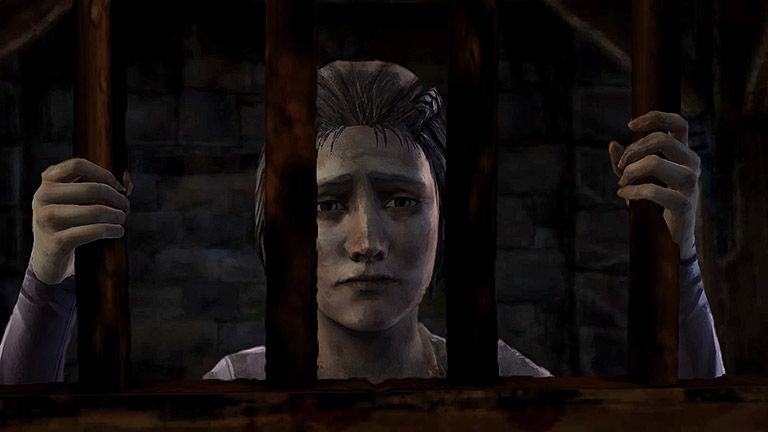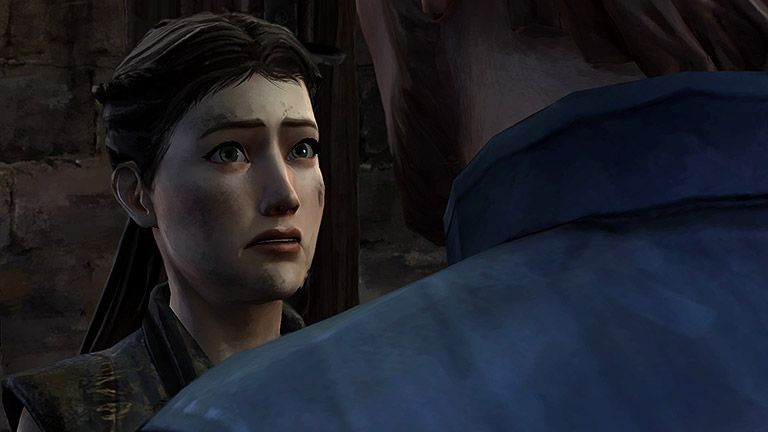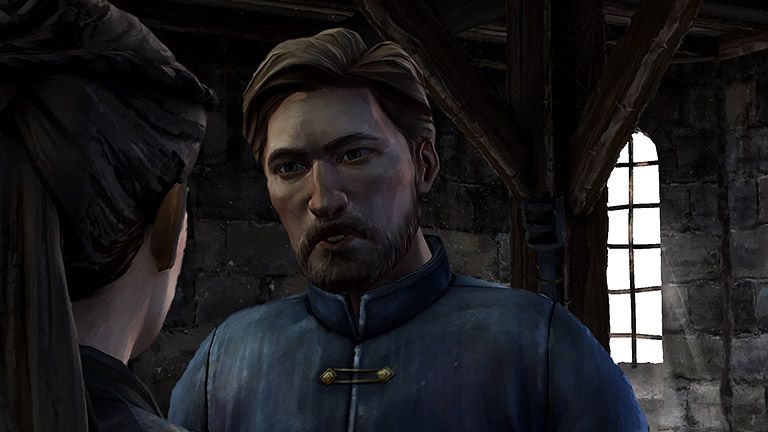It's hard to say anything new about Telltale's episodic Game of Thrones adventure at this point that hasn't already been said five times prior: it's buggy, it's boring, it's ugly and it feigns player agency in a surprisingly insulting way. With Episode Five - A Nest of Vipers, however, Telltale did something completely unexpected: it ended the episode on a choice that mattered. A life-or-death decision that asked you to choose between two prominent characters, this choice not only raised the stakes for the player, but for Telltale as well; the developer would need to build radically different versions of Episode Six to fully realize the consequences of that choice. Now, having played through the entire episode twice to experience both versions, I can confidently say that while Episode Six does a better job than any previous episode at making good on the player's decisions, it's still kind of a mess anyway.
Episode Six benefits from being a season finale: there are no new episodes on the immediate horizon to account for and no announcement of a second season just yet. As a result, Episode Six offers much more divergence than we've been used to in previous episodes. Your actions here can produce wildly different outcomes for specific characters, and who makes it out of this first season alive is in part up to you and the choices you'll make in this episode, lending much more weight than usual to each decision.
Let's not get crazy here, though. Save for a few key spots, your input is still largely discarded as irrelevant. For my second playthrough, I wanted to do a little experiment to see how much my input actually mattered: whenever possible while playing as Gared, I chose silence for every dialogue option, never taking a stand one way or another on anything unless the game forced me to do so. As it turns out, conversations play out identically, with characters responding back with the exact same lines of dialogue as they had in my previous playthrough and events proceeded unchanged. As well, I would occasionally press the wrong button intentionally during quick-time events or even let them slide right by me with no input at all just to see what would happen; while many of them result in an instant death and restart of the scene, many more continued on happily as though I had pressed the correct button. It's more than a little discouraging just how little Telltale values player input when you see it for yourself.
Of course, the big question here is not whether Telltale suddenly respects player agency, but whether they can honor the one true moment of it in the series so far — that life-or-death decision that ended Episode Five. And for the most part, the answer is surprisingly yes. Depending on which protagonist you picked to die, the other will indeed live in Episode Six and it does meaningfully change how the finale plays out. By the end, though, events do manage to converge more than you'd want by replicating the final scene exactly regardless of which character you played as and which choices you made in this episode. That's kind of disappointing, but not wholly unexpected. This season's conclusion for your chosen protagonist and for the war between Houses Forrester and Whitehill ends up being more of an all-out bloodbath than a narratively satisfying conclusion as a result — there's no peaceful resolution here no matter how you play. Everything all comes to a head in relatively the same way for everyone.
Similarly, while Gared's storyline has a couple moments that seem like they could lead to substantial divergence, there's no real payoff here and it's hard not to feel unfulfilled as a result. Gared's part in the fate of House Forrester has long held the most mystery of the bunch. His quest for the North Grove has carried him from lowly squire to proud member (then deserter) of the Night's Watch to fugitive beyond the Wall. But Episode Six doesn't sufficiently answer or even ask the questions you'd want to know at the end of Gared's journey for this season, content instead to pepper you with decisions that carry no weight because they're not properly explained. For instance, is it worth it to compromise Gared's morals by say, engaging in a little sacrificial "bloodmagic"? Well, it's a little hard to say since it's never really made clear what that even means, how it works, what the risks and potential benefits are. Instead, Telltale slaps you with a cheap ploy to tug at your heartstrings that falls flat because you don't have enough information either way. Likewise, Gared's final decision feels monumental but lacks build-up or even resolution: it forces his story to either peter out or end in an unsatisfying cliffhanger.
Once again it's Mira, still struggling to stay alive amidst the treachery and deceit of King's Landing, who has the most impactful tale of the Forrester children. Telltale wastes no time in throwing Mira into a tough moral scenario that tests her sense of loyalty. The first time I played it, I stuck to the moral high ground and felt good about my decision even as it ultimately hurt Mira's position; the second time, I chose the lowlier option, one that's hard to feel good about at the time even as it seemingly helps Mira. That's been a common theme for Mira in past episodes and it's one that best encapsulates what the Game of Thrones universe is about: honor gets you killed. King's Landing is a cutthroat arena to be thrown into, and the stakes on Mira are higher than they've ever been. There isn't really a feel-good ending to be achieved here, but things can work out in satisfyingly different ways depending on how far you're willing to compromise.
Game of Thrones is available on everything under the sun from consoles to mobile and PC, and it's never been hard to identify that fact as a particular pain point for Telltale as it struggles to get the game running well on every platform. Constant hitching, a variable frame rate, muddy textures, characters that flash in and out are all par for the course for Game of Thrones, and Episode Six has it all and then some. None of those issues are a surprise anymore, but Episode Six does manage to bring a new one to the table: incorrect input graphics. While reviewing the PlayStation 4 version of the game, an action prompt gave instructions to "swipe up" on the left analog stick, a holdover from the game's mobile version. Later, just before the credits, a prompt to skip the end-of-season summary popped up displaying the B button from the Xbox One version of the game instead of the circle button. It's shoddy work like that that keeps Game of Thrones from feeling anything but slapdash.
Closing Comments:
It's been a full four months since Episode Five ended on a massive decision that left players reeling. Given Telltale's past work on the series, it was hard to imagine that Episode Six would actually do right by that decision and manage to wrap the season up in a remotely satisfying way. Sure enough, huge chunks of Episode Six are just as middling as everything else in the season, and on a technical level, it's even worse. Still, there's bright spots throughout the episode, especially with Mira's storyline, that prove enjoyable enough that players who have made it this far should finish it out.




